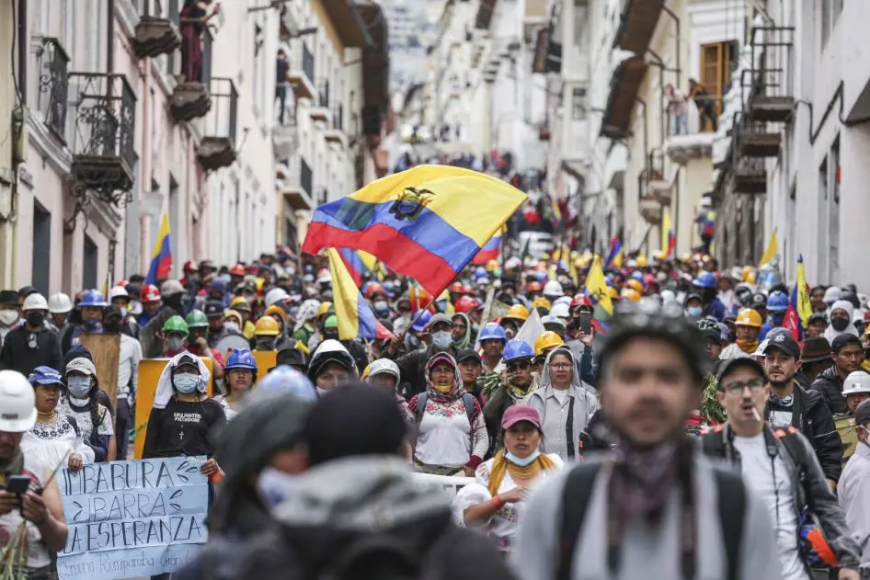Political and Environmental Developments in Ecuador: Indigenous Groups' Call for Recognition and Reversal of Rights Violations
encored.xyz, breaking news, encored, encorednews

Political and Environmental Developments in Ecuador: Indigenous Groups' Call for Recognition and Reversal of Rights Violations
Introduction
Ecuador has recently witnessed significant political and environmental shifts, particularly driven by indigenous groups advocating for the protection of nature. This movement follows a landmark court ruling that recognizes the rights of nature and addresses violations against it. This article delves into the details of these developments, highlighting the court's decision, the indigenous groups' demands, and the broader implications for Ecuadorian politics and environmental policies.
1. Historic Court Ruling on the Rights of Nature
1.1 Background of the Ruling
In a landmark decision, Ecuadorian courts have ruled in favor of recognizing the rights of nature. This ruling marks a significant step in the country’s legal framework, acknowledging that nature has inherent rights and should be protected from exploitation and degradation.
1.2 Legal Implications
The ruling affirms that nature is entitled to legal representation and protection. This legal recognition requires the government and corporations to consider the environmental impact of their activities and ensure that nature's rights are upheld.
2. Indigenous Groups' Response
2.1 Overview of Indigenous Groups
Ecuador is home to several indigenous communities who have long been at the forefront of environmental activism. These groups have consistently advocated for the preservation of their ancestral lands and natural resources.
2.2 Calls for Recognition
In response to the court ruling, indigenous groups are calling for the formal recognition of their rights and the reversal of previous violations. They argue that the ruling should translate into tangible actions to rectify past environmental harms and prevent future ones.
2.3 Specific Demands
- Restitution of Lands: Indigenous groups are demanding the return of lands that have been taken or damaged by mining, oil extraction, and other activities.
- Compensation for Environmental Damage: They seek financial compensation and resources to restore ecosystems that have been degraded.
- Strengthening Legal Protections: There is a call for stricter enforcement of environmental laws and more robust protection for indigenous territories.
3. Political Implications
3.1 Impact on Government Policy
The court ruling and indigenous demands are putting pressure on the Ecuadorian government to revise its environmental policies and legal framework. There is an increasing call for the government to align its policies with the principles established by the court.
3.2 Political Reactions
The ruling has elicited mixed reactions from various political factions. While some support the indigenous groups' demands and advocate for enhanced environmental protections, others view the ruling as a challenge to economic development and industrial activities.
3.3 Future Political Landscape
The situation is likely to influence the upcoming elections and political discourse in Ecuador. Candidates and political parties may need to address environmental and indigenous issues more prominently in their platforms.
4. Environmental Impact
4.1 Immediate Effects
The ruling has led to immediate actions to halt projects that threaten nature, including suspending certain mining and oil drilling operations. These actions aim to prevent further environmental degradation.
4.2 Long-term Consequences
In the long term, the ruling could lead to more sustainable development practices in Ecuador. It may prompt a shift towards green technologies and more responsible resource management.
5. International Reactions
5.1 Global Support
The ruling has garnered international attention and support from environmental organizations and human rights groups. Many view it as a progressive move that could inspire similar legal frameworks in other countries.
5.2 Criticism and Concerns
Some international business and industrial interests have expressed concerns about the potential impact on investment and economic growth. They argue that stringent environmental regulations could deter foreign investment.
Conclusion
Ecuador's recent court ruling on the rights of nature represents a pivotal moment in the intersection of politics and environmental justice. The indigenous groups' calls for recognition and reversal of rights violations highlight the ongoing struggle for environmental and social equity. As Ecuador navigates these developments, the outcomes will have significant implications for its political landscape, environmental policies, and international relations.

 Admin
Admin 





